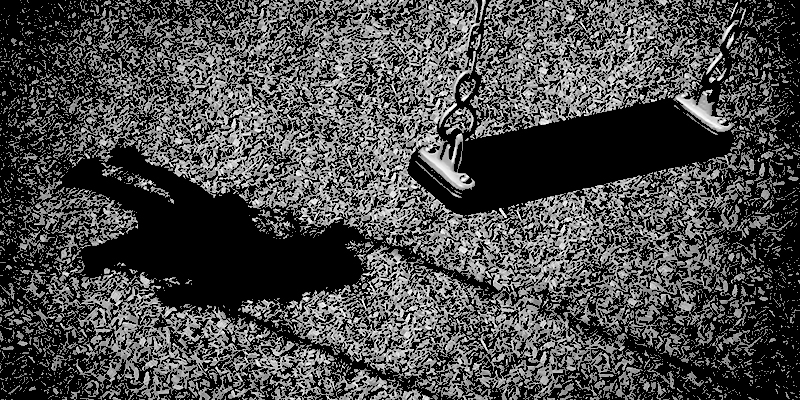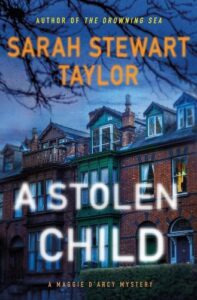More than once, I’ve found myself sitting around with other parents of no-longer-small children, all of us telling stories in hushed voices about the times our kids went missing. It goes without saying that we only tell these stories because we are past the point where we might be tempting fate, because our children are older now and our fears for them are of a different sort. And of course we can only recount these tales because, in the end, they had happy endings; the children were returned to us.
My husband and I once lost the oldest of our three children in a busy Washington, D.C. hotel during Barack Obama’s inauguration. Then an always-on-the-go three-year-old, our son sprinted ahead of us into a waiting elevator, threw us a devilish glance, and pushed a button. We watched in horror as the doors closed before we could reach him. Clutching our other son, an infant, and carrying the boys’ stroller, we ran down the stairs to the lobby, but when the elevator doors opened, our little explorer wasn’t there. For fifteen awful minutes, we couldn’t find him. Then suddenly, he appeared with a hotel security guard who’d found him on an upper floor. He’d been riding the elevators, having an adventure.
As terrifying as that was, it was the disappearance of our younger son when he was two that still gives me chills. He had been playing quietly on his own in our rural backyard while I fed his infant sister and when I went to check on him a few minutes later, he wasn’t where I’d left him. At first, I walked calmly around the yard and then into the house, calling his name. I checked outside again. Inside again. I couldn’t find him anywhere. I called for my husband and our older son to search too but there was no sign of him in the yard or in our woods. After twenty minutes, I started to panic in earnest and rushed down to the swimming hole near our house. I was relieved to see the clear surface of the water unbroken and went back and checked our barns and outbuildings. He just . . . wasn’t anywhere. All the awful possibilities swirled in my head. Terrified, the minutes ticking by, we were about to call the police when my husband shouted to tell me he’d found our son. He’d crawled into the very back of a deep closet and fallen fast asleep. He woke up bewildered by our frantic voices and desperate hugs. Thirteen years later, my memories of that hour or so of dawning fear haven’t lost much of their sharpness.
Until now, I had never written a mystery about a missing child. As crime writers, I think we are always exorcising our fears on the page, but I didn’t have enough distance to write about this one. As I got farther and farther from that stage of early parenthood though, I started to think about a missing toddler mystery for my series detective, homicide investigator and mother Maggie D’arcy, to solve. When she and her partner respond to a crime scene, it’s Maggie, with her parental intuition, who realizes that the young model found murdered in her Dublin apartment had a toddler — and that the little girl is missing. Maggie and her colleagues know they are racing against the clock to find the little girl, but her disappearance becomes more and more confounding the harder they look. I can’t say that writing a novel featuring the hunt for a missing child took away the power of some of my own worst moments as a parent, but I found it rewarding to mine this deep vein of love and pain and urgency for my fiction.
Here are some of the richest and most chilling crime stories and novels about the disappearances of young children (I could have made an equally long list of novels featuring the disappearances of teenagers):

The Adventure of Johnnie Waverly by Agatha Christie
This early Hercule Poirot story has such a great set-up: a man named Marcus Waverly consults Poirot because he has received multiple anonymous warnings that his young child will be kidnapped. Despite layers of precautions, the child is taken and Poirot is called in to find out what happened. The solution is classic Christie, as is the circle of suspects in the Waverly house.

Bunny Lake is Missing by Merriam Modell, writing as Evelyn Piper
This 1957 novel was new to me and I was glad to have the chance to experience its surreal strangeness and mid-century paranoia. Single mother Blanche Lake goes to retrieve her three-year-old daughter, Felicia, nicknamed Bunny, from her first day of nursery school and discovers that not only is her daughter not there, but that the staff claim never to have seen her at all. Blanche’s odyssey around New York looking for Bunny is laced with anxiety and judgment about unwed mothers and women in the workplace. The novel has the feel of a noir film — it ended up being adapted for the screen by Otto Preminger in 1965 — and offers a Cold War-era spin on a thriller about a gaslit woman.

Where Are the Children by Mary Higgins Clark
The urtext of multiple point-of-view missing child thrillers, Mary Higgins Clark’s 1975 blockbuster both launched her crime fiction career and a subgenre. Re-reading this suspense classic after many years, I was struck by how many of the hallmarks of contemporary psychological suspense are here: the mother with a tragic past, the creepy abductor, his identity obscured and his point-of-view chapters creating rising dramatic tension; the true crime afficionado neighbor; the climactic final scene. The story of Nancy Harmon and her kidnapped children Missy and Michael recently got an update, with a sequel penned by bestselling thriller writer Alafair Burke called Where Are the Children Now?
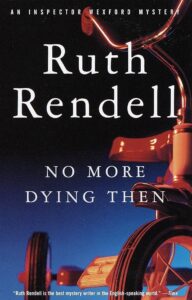
No More Dying Then by Ruth Rendell
I’ve been re-reading from my Ruth Rendell/Barbara Vine shelf recently and I found this 1972 Inspector Wexford novel as dark and tense as I’d remembered. Wexford’s colleague Mike Burden is deep in grief for his dead wife when he becomes entangled with the mother of a missing five-year-old boy. The disappearance of another child looms in the background and Wexford diligently follows all the leads while a compromised Burden sets off on an increasingly disastrous path toward a solution.
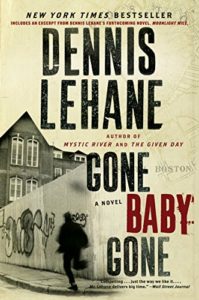
Gone Baby Gone by Dennis Lehane
This gut punch of a novel is the fourth installment in Lehane’s Patrick Kenzie/Angie Gennaro noirish private eye series. When Kenzie and Gennaro are hired to look into the disappearance of four-year-old Amanda McCready, they find themselves in very dark places as they consider what might have happened to Amanda, and in very murky moral territory as they consider what to do with the information they find.
It wasn’t the last time Lehane would write about missing children. In Mystic River, the kidnapping of eleven-year-old Dave Boyle in 1975 sets in motion a tragic series of events that Lehane explores on a tragic, Shakespearean scale. His excellent new novel, Small Mercies, is also about a missing daughter and the lengths to which a mother will go to find her.

Heaven, My Home by Attica Locke
I love everything Attica Locke has written and the two (so far) novels in her series featuring Black Texas Ranger Darren Mathews are both triumphs of characterization, setting, and plotting. In Heaven, My Home, Mathews is tasked with finding the missing son of a white supremacist. Locke draws Mathews as a conflicted, angry, skilled, and compassionate investigator, who wants to find the boy despite his father’s monstrousness. The solution is heartbreaking and surprising and as always, Locke makes you feel like you’ve been to her settings along Caddo Lake and breathed the humid, unsettled East Texas air.

The Child Finder by Rene Denfeld
Denfeld’s dreamy, icy tale of a woman who was herself a missing child and now uses her skill and intuition to find other lost children is suffused with fairy tale influences and atmosphere to spare. Years after a five-year-old child goes missing in the Oregon wilderness while looking for a Christmas tree with her family, Naomi Cottle is hired by the girl’s parents. As Naomi searches for the little girl, she is visited by her own confused memories of what happened to her while she was missing years before. I loved how Denfeld’s novel connects a missing child narrative to the many missing children in fairy tales and folklore.

Rose Gold by Walter Mosley
The central missing person in Mosley’s thirteenth Easy Rawlins mystery is actually a college student named Rosemary Goldsmith, the daughter of a weapons manufacturer. But in a strikingly affecting subplot, Mosley also tracks down a five-year-old boy abducted while his mother grieves her dead husband. Mosley’s depiction of the mother’s exhausted terror is especially well-done, and the answers he finds strike a satisfying note.
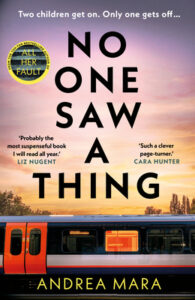
No one Saw a Thing by Andrea Mara
The premise of Irish crime writer Mara’s nail-biting new novel is a nightmare most parents have probably imagined once or twice. On a busy London train platform, Sive, visiting from her home in Dublin, is separated from her two young daughters when she looks down at her phone for a moment and the train doors close. (I felt this scenario vividly — see above.) She motions to them to get off at the next stop but when she gets there, the older girl isn’t there and no one has seen her. The plotting is twisty and puzzling and goes back to events in the past in Sive’s husband’s circle of housemates and friends. Mara captures Sive’s desperation so completely that you can’t put the book down until you find out what’s happened to the girl.
***

